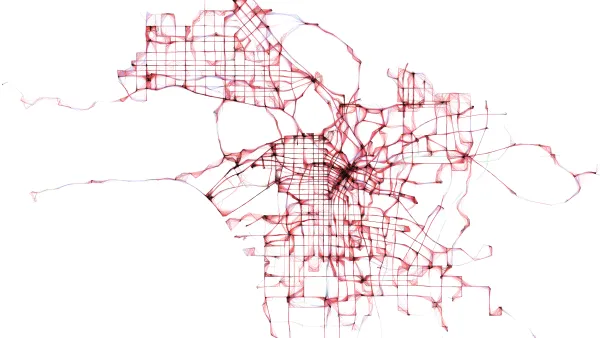Azeen Ghorayshi looks at how Oakland's civic hackers are trying to change the city through technology -- giving people greater access to data, increasing transparency, and keeping people better informed -- all with minimal investment by the city.
In 2007, Michal Migurski took an outdated and cumbersome city crime-mapping website that "contained useful information" and converted it into "Oakland Crimespotting" a far more successful website "that allows people to track crimes by date, neighborhood, and crime type, all laid out on a relatively intuitive interactive map," writes Ghorayshi. The only caveat: He did it by hacking into the city's data. After some initial reservations, the city became welcoming of Migurski's efforts, and forged an enduring partnership with him and his hacker colleagues.
Migurski's site is just one example of Oakland's "breakthroughs in civic hacking," and of the national trend towards greater use of technology to create better cities. "The idea [behind the open data movement] is that data — whether on crime, budgets, liquor licenses, or disease outbreaks — can be organized and presented in a way that's more useful to the public. And giving people greater access to data not only increases transparency, but it also makes people better informed. The ultimate goal is to create a more engaged citizenry, which, in the grandest Obama vocabulary of the movement, is 'the essence of democracy.'"
Ghorayshi points to cities such as Boston and Philadelphia, which are now funding in-house, but low-cost, research and development departments that aim to "[b]ring together civic hackers, fiddle with existing code, and test out new ways of solving old problems." This response has also become popular as a way of being able to "do more with less" in the face of shrinking municipal budgets and staffs.
When considering the future of Oakland Crimespotting, Migurski says, "I don't think it's particularly sustainable." He adds, "My sense about the civic coding thing is that you still need people who have the itch, interest, and energy to bring the data out in the open and show there's a demand there, and then over time it will be a thing that is expected of cities to provide for their citizens." He concludes, "This isn't a cool faddish new thing; it's a thing like police, fire, and transit that citizens need. It's a responsibility that governments have, especially with something like crime. You already run the police, you already collect that data, so it makes sense that the people who collect that data should also be responsible for sharing it with the public."
FULL STORY: Cracking Oakland's Code

Analysis: Cybertruck Fatality Rate Far Exceeds That of Ford Pinto
The Tesla Cybertruck was recalled seven times last year.

National Parks Layoffs Will Cause Communities to Lose Billions
Thousands of essential park workers were laid off this week, just before the busy spring break season.

Retro-silient?: America’s First “Eco-burb,” The Woodlands Turns 50
A master-planned community north of Houston offers lessons on green infrastructure and resilient design, but falls short of its founder’s lofty affordability and walkability goals.

Test News Post 1
This is a summary

Analysis: Cybertruck Fatality Rate Far Exceeds That of Ford Pinto
The Tesla Cybertruck was recalled seven times last year.

Test News Headline 46
Test for the image on the front page.
Urban Design for Planners 1: Software Tools
This six-course series explores essential urban design concepts using open source software and equips planners with the tools they need to participate fully in the urban design process.
Planning for Universal Design
Learn the tools for implementing Universal Design in planning regulations.
EMC Planning Group, Inc.
Planetizen
Planetizen
Mpact (formerly Rail~Volution)
Great Falls Development Authority, Inc.
HUDs Office of Policy Development and Research
NYU Wagner Graduate School of Public Service



























